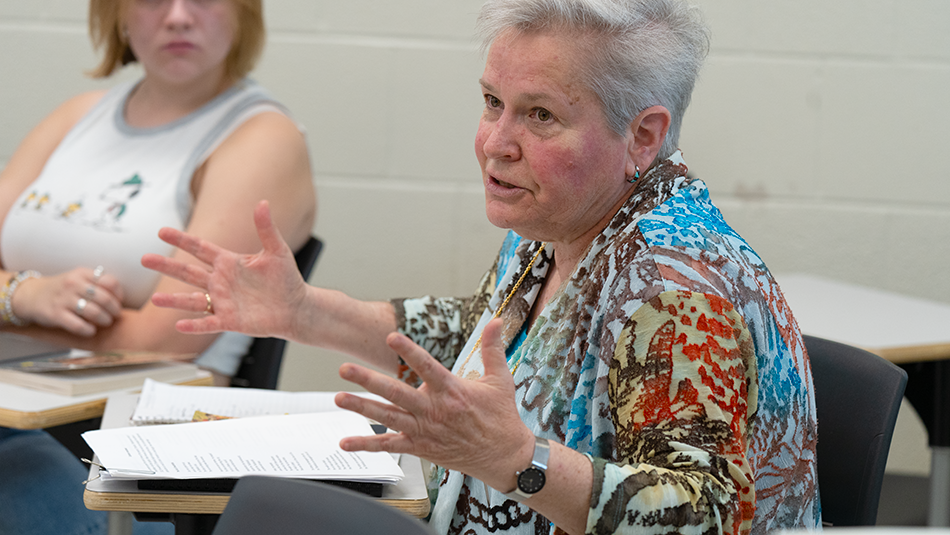
A simple note from a violin teacher put a third grade Julie Rosenfeld on a path that would eventually have her perform in more than 1,200 concerts across 20-plus countries.
The note came from Ethel Campbell, who was part of a program that sent string instrument teachers to elementary schools across the Los Angeles, California, area. Rosenfeld grew up in a family of music lovers and said her parents were happy to let her explore the new musical opportunity.
“I was a smaller kid, so the obvious string instrument for me was the violin,” Rosenfeld said. “I soon started sawing away on this little violin. I’m sure it sounded horrible; my poor parents didn’t know what they had gotten into. Within a month, though, Miss Campbell sent a personal note to my parents saying that she felt I was very, very talented and that I should seek private instruction. She gave us some names to reach out to and it became apparent that I was good. I thank Ethel Campbell every day. I could not have done any of this without her.”
Those early efforts paid off as Rosenfeld built a career around her musical talents, specifically with the violin. She spent 32 years as the First Violinist of the Colorado String Quartet, an internationally recognized group that was the winner of both the Banff International String Quartet Competition and the Naumburg Chamber Music Award. Rosenfeld played concerts across the globe, making stops in all 50 states, as well as Holland (Netherlands), Belgium, Germany, France, Spain, Italy, Korea Israel, Peru, Mexico, Colombia and Canada.
“We had an incredible run,” Rosenfeld said. “It’s the dream of any young violinist to be part of a string quartet of this nature. I couldn’t have asked for a better or more fulfilling experience.”

Even when her time with the quartet came to an end in 2013, Rosenfeld continued to find ways to share her passion for the violin. She joined the School of Music at the University of Missouri in 2014 and currently serves as an associate professor of violin.
“I had been looking for new opportunities and I became more and more interested in the educational aspect of music,” Rosenfeld said. “For years, I’d had wonderful and nurturing teachers. How can I ever thank them? One way is to have students of my own who I can pass along this knowledge that I’ve been so fortunate to gather over the years. I want to encourage the next generation of musical experts, and it’s exciting to be a small part of their journeys.”
While Rosenfeld has shared her expertise with students across the School of Music for a decade, over the past few years she has also been active in the Honors College as affiliate faculty, primarily within the Humanities Sequence.
“I was friendly with Maya Gibson, and she approached me about my interest in being part of the Humanities Sequence,” Rosenfeld said. “As I looked at what was being taught, I realized that a good portion of it was right in my wheelhouse. I didn’t grow up with musical parents; my mom was a librarian, and my dad was a lawyer. My background was very much in the humanities, so the idea of working with Honors College students in this area was very exciting.”
Rosenfeld will have an opportunity to expand on her work with Honors students during the upcoming academic year. She was recently named an Honors Faculty Fellow, which will allow her to teach a class and lead a study abroad experience after the spring semester. Both opportunities are an extension of the Humanities Sequence.
“My history has obviously been in performing, but I have also been very involved in doing musical research into any piece that I’m playing,” Rosenfeld said. “I find it very important to understand what the composer was going through as they were creating the music, as well as what was happening in the world during the time the music was being written.”
The study abroad program that Rosenfeld has developed is focused on “Degenerate” music, a label that was applied by the government of Germany during the 1930s to forms of music that it considered harmful. The experience will take students to Vienna, Austria, and Budapest, Hungary, where they will meet with museum curators, visit important monuments and dive into the culture of both cities.
“As I’ve matured as a musician and as a person, my Judaism and my interest in music have started to coincide in many ways,” Rosenfeld said. “Many of the great musicians in the 1930s who had to flee the Nazis were Jewish, and they all wrote music that was called ‘Degenerate.’ I’ve always had an interest in studying the music, as well as the art, of this period.”
Rosenfeld has a special connection to the study abroad program, too. Her father was born and raised in Vienna and he and his family fled the country in 1938 after Nazis took over. They lived in France for a year before eventually coming to the United States. While it was a terrifying time, Rosenfeld said her father was able to find some joy in music.
“There was obviously a great history of music in Vienna, and my father was inherently a musical teenager,” Rosenfeld said. “He loved to sing and enjoyed what was being produced at the time.”
Rosenfeld spent time in both Vienna and Budapest this summer, making connections and mapping out potential stops for students who participate in next semester’s study abroad experience.
“It was really incredible to be there, and I really enjoyed having the chance to map out the itinerary,” Rosenfeld said. “I’m ready to share those experiences with Honors students.”